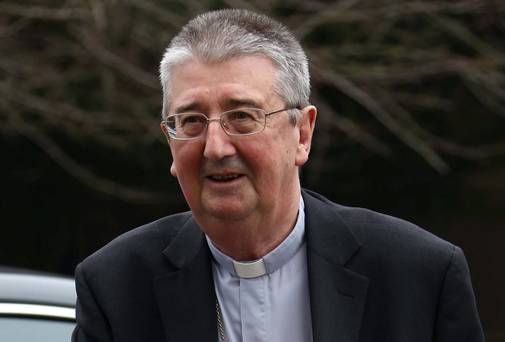Archbishop Diarmuid Martin, Archbishop of Dublin has said that Hungary’s 1956 uprising offers lessons for Europe today. Archbishop Martin was speaking at a service of remembrance in Saint Mary’s Pro-Cathedral, Dublin, to commemorate the sacrifice of Hungarian revolutionaries in 1956. The service was organised by the Hungarian Embassy to remember the 1956 uprising and to thank Irish people who took refugees from Hungary at that time.
In his homily Archbishop Martin shared his memories of watching the news of the 1956 uprising. He said, “In 1956 I was eleven years old. I had one great passion in life: television news. Many here today will not remember that in 1956 there was no Irish television service. That came only at the end of 1960. You could, however, with difficulty place a large antenna on your chimney and receive BBC television from Belfast or from Manchester – placing your chimney and that of your neighbours at grave risk if there was to be a storm. But most of the time you got a more or less visible image.
“News programmes were my interest. My hope was one day to be a broadcaster myself, so I was attentive to all the techniques that were used and watched as methods of programming and communication developed.
“At eleven years old, I was stunned by the 1956 uprising in Hungary It seemed to be a moment which would change history. For the first time in my life I followed a major world event blow by blow. It was exciting and I developed a real sympathy for courageous people in Budapest and around Hungary. Cardinal Mindszenty was released and welcomed with worldwide recognition.
“Then suddenly all changed. People who were courageously asking just for minimum recognition of their rights, as individuals and as a people, were faced with the violent oppression of their aspirations.
“Names changed. Leaders whose names symbolised hope to an eleven year-old Dubliner were replaced by faceless bureaucrats put into place to impose a different Hungary. Appeals for help from the outside world fell on deaf ears. Cardinal Mindszenty took refuge in the American Embassy giving some hope that his exile in his homeland would be short lived. But that was not to be so.”
Addressing Ireland’s role in receiving refugees at that time, Archbishop Martin said, “I was proud that Ireland began to offer hospitality to refugees from Hungary. For the first time in my life I began to understand what solidarity among nations meant.”
Archbishop Martin went on to say, “The dominant impression I was left with, however, even at that young age, was a sadness about the fate of small nations in a world of harsh realpolitik, when appeals for help were met by cold rationality.
“The Gospel reading we have heard is about two institutional figures – a priest and a Levite – who walk past an abandoned and suffering man. It is then about another, an outsider, a Samaritan, who is moved to compassion.
“Wherever the words mercy and compassion appear in a parable then the reference is really to Jesus himself. Two figures of respectability and institutional status pass-by uncaring. An outsider, a Samaritan, someone barely tolerated in respectable society, passes by and is moved by compassion. This outsider is the image of Jesus.
“Jesus, in this parable, is giving a new definition of what respectability means: it has nothing to do with prestige or institutional position or title or power. It is the person who cares and who is moved to compassion who is respectable in Jesus’ eyes. If the name of God is mercy and compassion, how can we be intolerant and judgemental and merciless and uncaring and still believe that we are respectable?”
Archbishop Martin said, “This is not a parable just about personal piety. It refers to the many ways in which we encounter neighbours and how we treat them. I think of various minorities who are our neighbours: I think of immigrants seeking new life for themselves and their children; I think of the poor and the homeless; I think of our traveller community; I think of the elderly and the lonely. We can walk by and ignore appeals, or we can let compassion rule.
“I think of how there are still those who feel that violence can be the answer: I think of domestic violence; I think of the drug-related violence in our city; I think of the epidemic of stabbings in Ireland; I think of the violence of irresponsibility on our roads. Those who resort to violence may think that they have resolved a problem. They feel they have won. But the lesson of the Hungarian people in 1956 indicates who, in the annals of history, is remembered as the truly noble. I think also of small nations and people in our world today; I think of victims of religious intolerance; I think of peoples we expose to climatic disasters so that we can feel comfortable.
“Sixty years on we can reflect and remember the past but we must also learn lessons for Ireland and for Hungary and for our Europe today. I would love to see a passion for the protection of small nations and people be a top priority for Irish foreign policy, even if at times it meant taking an independent stance from partners.
“The parable about the Good Samaritan is not a parable just about personal piety. But policy and politics and public opinion change not just through swings in voting majorities. Change of hearts is what brings real change. It is men and women of integrity and idealism who change society. It is men and women who reflect the mercy and compassion of Jesus who show us the type of caring world we all long for.”
ENDS


